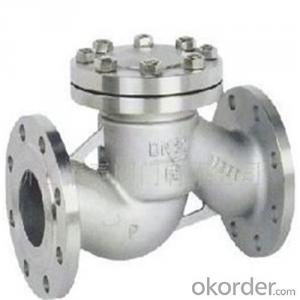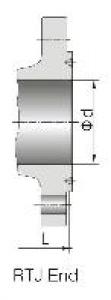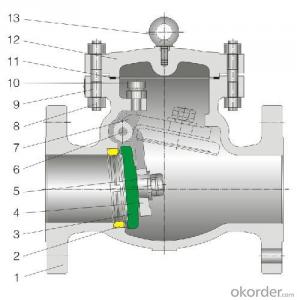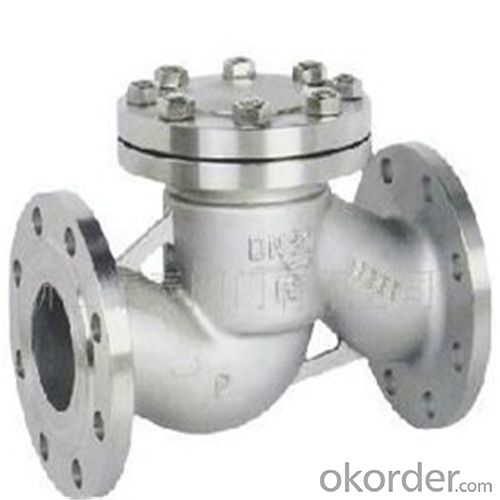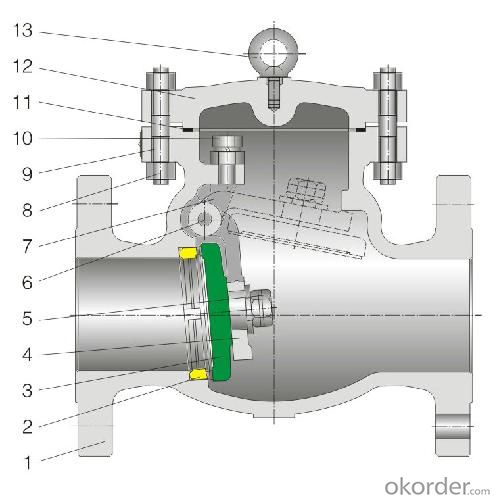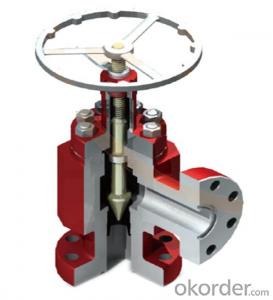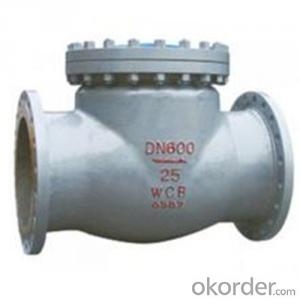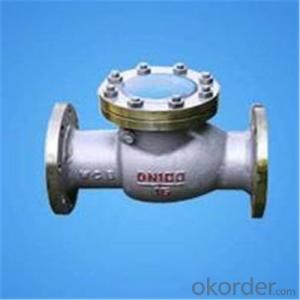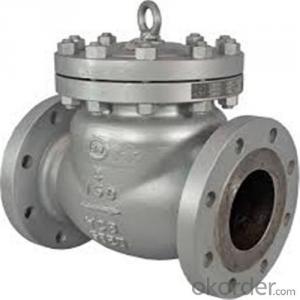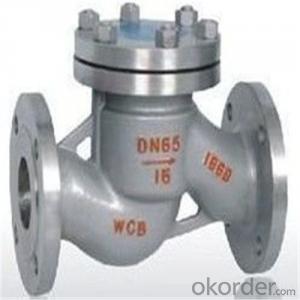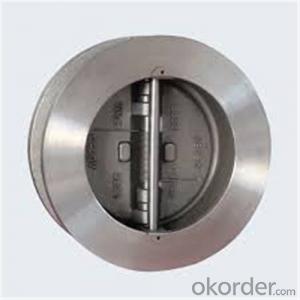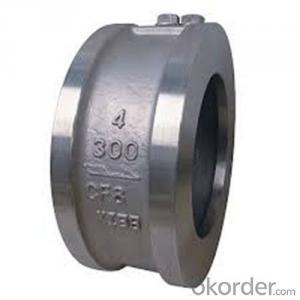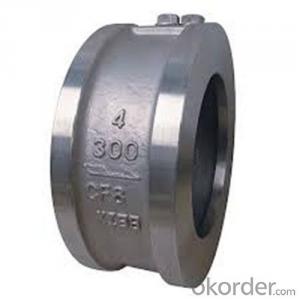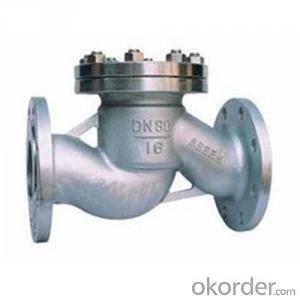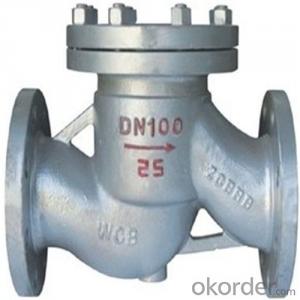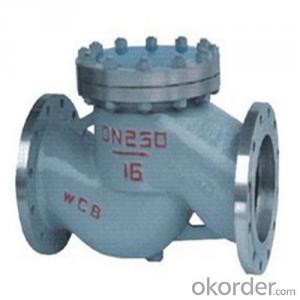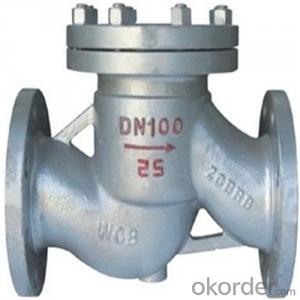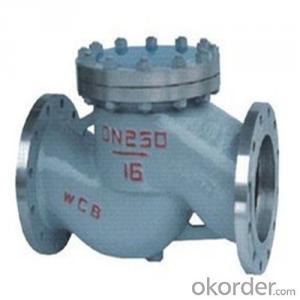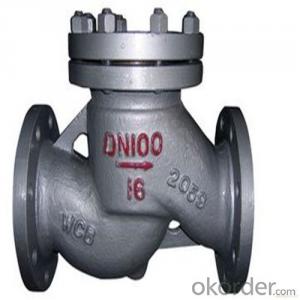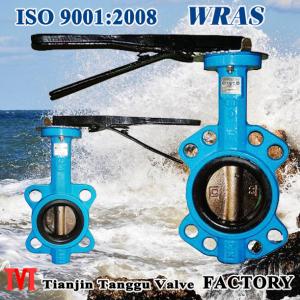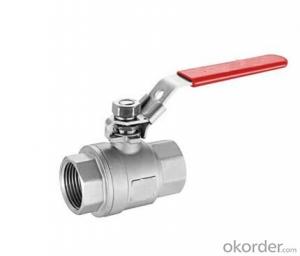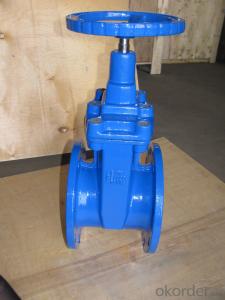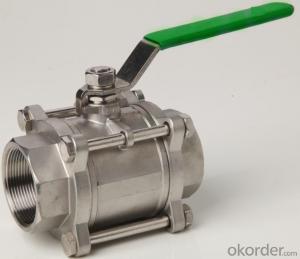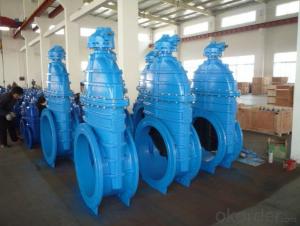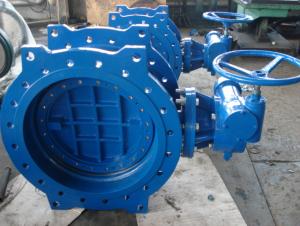API Cast Steel Lift Check Valve Size 400 mm
- Loading Port:
- Shanghai
- Payment Terms:
- TT OR LC
- Min Order Qty:
- 10 pc
- Supply Capability:
- 100 pc/month
OKorder Service Pledge
OKorder Financial Service
You Might Also Like
API Cast Steel Lift Check Valve 150 Class
The features of Cast Steel Lift Check Valve
Bolted Bonnet;Swing and lift disc;Metallic seating surfaces.
Body and Bonnet Connection of Cast Steel Lift Check Valve:
The body and bonnet of Class150~Class900 check valves are usually with studs and nuts.And the body and bonnet of Class1500~Class2500 check valves are usually of pressurized seal design.
Body-To-Bonnet Joint of Cast Steel Lift Check Valve:
Stainless steel + flesible graphite wounded gasket is used for Class 150 and Class 300 check valve;Stainless steel + flexible graphite wounded gasket is used for Class 600 check valve,and joint gasket is also optional for Class 600 check valve;Ring joint gasket is used for Class900 check valve;Pressurized seal design is used for Class 1500~Class 2500 check valves.
Seat of Cast Steel Lift Check Valve:
For carbon steel check valve,the seat is usually forged steel.The sealing surface of the seat is spray welded with hard alloy specified by the customer.Renewable threaded seat is used for NPS<10 check="" valves="" and="" welded="" on="" seat="" can="" be="" also="" optional="" if="" being="" requested="" by="" the="" customer.welded="" is="" used="" for="" nps="">12 crbon steel gate valves .Forstainless steel check valve,integral seat is usually adopted ,or to weld hard alloy directly integrally.Threaded or welded on seat is also optional for stainless steel check valve if being requested by the customer.
Parameter of Cast Steel Check Valve:
Standard Criteria | ASME/ANSI/API customize |
Pressure Rating | 150 Class 300 Class 600 Class 900 Class 1500 Class 2500 Class customize |
Valve Size | 50 mm 65 mm 80 mm 100 mm 125 mm 150 mm 200 mm 250 mm 300 mm 350 mm 400 mm 450 mm 500 mm 600 mm 650 mm 700 mm 750 mm |
2 inch 2.5 inch 3 inch 4 inch 5 inch 6 inch 8 inch 10 inch 12 inch 14 inch 16 inch 18 inch 20 inch 24 inch 26 inch 28 inch 30 inch customize | |
Actuator | Automatic customize |
Connection | Butt Welding Flange RF Flange RTJ customize |
1-Body Material | A216 WCB A351-CF8 A351-CF8M customize |
2-Seat ring | A351-CF8 A351-CF8M A105+13Cr Tool Steel+A105 customize |
3-Disc | Tool Steel+A216 WCB A351-CF8M A351-CF8 A216 WCB+13Cr customize |
4-Arm | A351-CF8 A216 WCB A351-CF8M customize |
5-Nut | A194 8M A194-8 A194 2H customize |
6-Arm pin | A182-F6a A182-F316 A182-F304 customize |
7-Yoke | A351-CF8 A351-CF8M A216 WCB customize |
8-Bonnet nut | A194 8M A194-8 A194 2H customize |
9-Bonnet bolt | A193-B8 A193-B8M A193-B7 customize |
10-Bolt | A193-B7 A193-B8 A193-B8M customize |
11-Gasket | graphite+304 graphite+316 customize |
12-Bonnet | A216 WCB A351-CF8M A351-CF8 customize |
13-Eye bolt | A181 customize |
Design Standard | API 6D BS 1868 customize |
Connection Standard | API 605 ASME B 16.25-2007 ASME B 16.47A ASME B 16.47B ASME B 16.5 MSS SP-44 customize |
Test Standard | API 598 API 6D customize |
Face to Face | ASME B 16.10 customize |
Pressure-temperature ratings | ASME B 16.34-2004 customize |
Wall thickness dimension | API 600 BS 1868 |
FAQ of Cast Steel Check Valve:
Q1:I can’t find the type of steel check valve which I need. what can I do?
The chart above only lists out some common composition of steel check valve parts.We may provide other different parts material composition according to the customer's request or the actual valve working condition.
Q2:Which certification do your products pass?
Our products are in accordance with ISO 9001、ISO 14001、API 6A、API 6D、TS CE、API607/6FA/BS6755.
- Q: Which is worse ? And what causes it? I was told I had mitro valve prolapse but I m symptoms had worsen and so I saw a cardiologist again today and they said I have mitro valve regeritation.
- Firstly both conditions are not necessarily serious. Prolapse is the phenomenon of one or both mitral leafets bending slightly into the left atrium when the heart contracts. Normally when the leaflets close they dont clise straight but form a slight tent shape facing towards the LV. With prolapse the leaflet bends beyond the imaginary straight line of the valve annulus. Regurgitation is simply back flow through a valve when closed - all valves function as one way check valves to ensure one way flow through the heart. Its completely normal to have a small amouny of regurgitation at all valves except the aortic valve. Mitral regurgitation typically worsens with prolapse because the valve isnt closing properly. Usually prolapse and mitral regurgitation are not all that serious and only require periodic monitoring. Consult your DR if you suddenly develoop symptoms like chest pain or breathlessness. These can indicate the valve is degenerating further and may require medical treatment.
- Q: Can you please explain to me what an atrial valve is and what it does??
- You're incorrectly combining two parts of the human heart, atrium(atria) and valves. The human heart has four chambers, two superior ATRIA and two inferior ventricles. The atria are the receiving chambers and the ventricles are the discharging chambers. The pathway of blood through the human heart consists of a pulmonary circuit and a systemic circuit. Blood flows through the heart in one direction, from the atria to the ventricles, and out of the great arteries, or the aorta for example. This is done by four VALVES which are the tricuspid valve, the mitral valve, the aortic valve, and the pulmonary valve
- Q: What is the best procedure to check/adjust valve clearances? This engine is a perkins diesel inside of a cat generator. I know that he exhaust valve is .018 and the intake valve is .008.
- Estoy muy apasionada de este mundo y todos mis amigos han confiado en mí a la hora de comprar un ordenador, yo siempre les he comprado de sitios web porque tienen la mejor oferta al mejor precio, pero, el ultimo ordenador que he comprado ha sido uno de juguete para mi hija, y como siempre he acertado, tiene la dimensión perfecta para ella, buenas canciones, aprende con él y imita muy bien un ordenador portátil con su ratón con todo, a ella le ha encantado muchísimo.
- Q: i wanted to know what is the actual difference between check valve (non return valve) and globe valve?
- Check valves are designed to prevent back flow. A globe valve is used when the ability to throttle and control the flow is desired. The globe valve can be positioned at anywhere from 1% to 100% flow. This allows for very precise control over how much liquid will be allowed to flow through the valve. There is another type of valve called a gate valve. The gate valve can not be positioned with such precision as the globe valve and it is used when flow rate is not as important.
- Q: Movers messed up the valve so hose won't screw in w/o leaking
- Buy a new valve at an appliance parts outlet. Make sure it's the right one. Many times they will come with instructions. Unplug the unit. Shut off the water and remove the hoses. Remove the back panel to access the valve. Remove the old broke valve and replace it with the new one. Replace the panel. Attach the hoses and turn on the water. Check for leaks. Plug in the unit and give it a test. Try all the temperature settings. Congratulations. You are now a professional..
- Q: Hi, I have Orbit valve for a section of my yard. The pressure is really low when I turn it on with my remote. When I turn it on manually at the valve, the water pressure is much higher.
- Its possible the valve stem is corroded with stuff not letting it actuate properly open. Turn water off and unscrew the valve then actuate it electrically while watching for a full stroke. Make sure flow control is all the way open when inspecting valves stroke. Remember where you had it set when done or readjust. Also check the solenoid for corrosion and clean linkages. I would clean and coat with petroleum jelly. My guess is valve seat is gummed up so lube the stem and work it manually till it slides open and closed easy then test with the solenoid. Good luck!
- Q: Are these valves are a kind of heart chambers pressure sensors?What is keeping them interlocked 2x2?
- It's all mechanical. The valves are passive things kind of like a screen door. When you push on them from one side they open, when you push on them from the other they close. The valves are assisted by some fibers attached to the inside of the heart similar to the way a screen door is helped by a spring attached to the door frame. It's the flowing blood that pushes the valves open or closed as the heart pumps. The path that the blood follows in the heart as it beats happens to make it so that the valves close two at a time. This is because the heart is actually four separate pumps that work two at a time. There's no direct electrical connection to the SA node. The only way they're connected is that the SA node firing is what causes the heart to pump, causing the blood to force the valves open.
- Q: How do I know if the valve seals need replacing? From what type of smoke can I detect?
- A 'leak-down' test is the best bet, shows where in the system the compression is leaking and if it's around the valve stems than for sure the seals need replacing. Can't judge it by the smoke accurately as oil could be slipping past the rings also.
- Q: First off I'm a girl. :) My 2.0 non turbo engine has a bent valve. I have been asked to pick up the valve. But I need to know if its for the intake or the exhaust. I know the guy how is going to fix it said he will have to sand down the cylender that it goes in it. The car sounds like it knocking when driving or sitting still. The guy who is going to fix it is at work right now and I'm suppose to order this part right now. Is it an intake or an exhaust valve?
- no way to tell ...and he doesn't sand down the valve ...it's called seating or lapping. and it's not done to the cylinder... knocking could aslo be a hung lifter.
- Q: I am a 55-year-old female going in for mitral valve replacement surgery, and I need to decide on which valve to get: bovine or mechanical. If you have any experiences or know anyone who's had either of these types of valves placed in their bodies, please elaborate on the experience. I want to know the pros and cons of each.Thank you.
- I had open heart surgery, repairs to my mitrial and tricuspid valves. On the mitrial valve, an Edwards Lifescience ring was placed to tighten valve and the tricuspid was just tightened. That was five yrs ago. Have more energy and feeling better, still. My surgeon did mention placing a porcine valve but once they got inside my heart, the DRs. choose the lifescience ring. I do take an anticoagulant but for other reasons for over 8 yrs now.
Send your message to us
API Cast Steel Lift Check Valve Size 400 mm
- Loading Port:
- Shanghai
- Payment Terms:
- TT OR LC
- Min Order Qty:
- 10 pc
- Supply Capability:
- 100 pc/month
OKorder Service Pledge
OKorder Financial Service
Similar products
Hot products
Hot Searches
Related keywords
